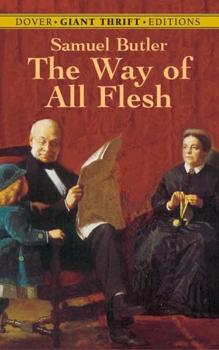Samuel Butler
Список книг автора Samuel ButlerErewhon Revisited Twenty Years Later, Both by the Original Discoverer of the Country and by His Son
"Erewhon Revisited Twenty Years Later, Both by the Original Discoverer of the Country and by His Son" by Samuel Butler. Published by Good Press. Good Press publishes a wide range of titles that encompasses every genre. From well-known classics & literary fiction and non-fiction to forgotten−or yet undiscovered gems−of world literature, we issue the books that need to be read. Each Good Press edition has been meticulously edited and formatted to boost readability for all e-readers and devices. Our goal is to produce eBooks that are user-friendly and accessible to everyone in a high-quality digital format.
Canterbury Pieces
"Canterbury Pieces" by Samuel Butler. Published by Good Press. Good Press publishes a wide range of titles that encompasses every genre. From well-known classics & literary fiction and non-fiction to forgotten−or yet undiscovered gems−of world literature, we issue the books that need to be read. Each Good Press edition has been meticulously edited and formatted to boost readability for all e-readers and devices. Our goal is to produce eBooks that are user-friendly and accessible to everyone in a high-quality digital format.
Essential Science Fiction Novels - Volume 1
Welcome to the Essential Science Fiction Novels book series, where you will find a selection of endless tales about the incredible technologies of the future, time travel and its consequences, adventures in interstellar spaceships, strange post-apocalyptic worlds, dangerous alien invasions and everything else the authors dreamed of or feared for the future of humanity.
For this book, the literary critic August Nemo has chosen the 5 novels by authors who created memorable stories that shaped the foundations of Science Fiction.
This book contains the following novels:
Frankenstein by Mary Shelley. Time Machine by H. G. Wells. Erewhon by Samuel Butler. From the Earth to the Moon by Jules Verne. A Princess of Mars by Edgar Rice Burroughs.
If you appreciate good books, be sure to check out the other Tacet Books titles!
Alps and Sanctuaries of Piedmont and the Canton Ticino
"Alps and Sanctuaries of Piedmont and the Canton Ticino" by Samuel Butler. Published by Good Press. Good Press publishes a wide range of titles that encompasses every genre. From well-known classics & literary fiction and non-fiction to forgotten−or yet undiscovered gems−of world literature, we issue the books that need to be read. Each Good Press edition has been meticulously edited and formatted to boost readability for all e-readers and devices. Our goal is to produce eBooks that are user-friendly and accessible to everyone in a high-quality digital format.
Erewhon and Erewhon Revisited
One of Samuel Butler's most famous works, «Erewhon» is the story of a fictional country in which Butler satirizes the Victorian society of the time in which he lived. An anagram of the word «nowhere,» «Erewhon» upon first impression appears to be a utopian society. However as the country is further detailed is becomes apparent that this is clearly not the case. The titular setting of the novel is loosely based on Butler's experiences as a young man working as a sheep farmer in New Zealand. The sequel, «Erewhon Revisited,» was published twenty-nine years after the original. In it we discover the identity of the unnamed protagonist of the first book, who returns to «Erewhon» and upon meeting his former lover Yram, discovers that he has fathered a child with her and that now the people of Erewhon worship him as a type of deity. Along with Butler's semi-autobiographical work «The Way of All Flesh» these works are among his most highly regarded, satires in the vein of Jonathan Swift's «Gulliver Travels.»
The Utopia MEGAPACK ®
Utopia. A community or society possessing highly desirable or nearly perfect qualities. It may be a dream, but it's a dream that has inspired writers for thousands of years. Plato's «Republic» may be the very first utopia presented to a mass audience, but Thomas More coined the term with his 1516 book Utopia (included here), which describes a fictional island society in the Atlantic Ocean. The term (and its antonym, dystopia) quickly entered the English language. And here are 19 other works, famous and not, featuring utopias and dystopias…works by Samuel Butler, Charlotte Perkins Gilman, Anna Bowman Dodd, William Morris, Sir Francis Bacon, and many others. Included are:<P> EREWHON, by Samuel Butler<br> MOVING THE MOUNTAIN, by Charlotte Perkins Gilman<br> HERLAND, by Charlotte Perkins Gilman<br> EQUALITY, by Edward Bellamy<br> CAESAR’S COLUMN, by Ignatius Donnelly<br> THE REPUBLIC OF THE FUTURE, by Anna Bowman Dodd<br> A CRYSTAL AGE, by W. H. Hudson<br> A TRAVELER FROM ALTRURIA, by W. D. Howells<br> FREELAND: A SOCIAL ANTICIPATION, by Dr. Theodor Hertzka<br> MIZORA: A PROPHECY, by Mary E. Bradley Lane<br> SOLARIS FARM, by Milan C. Edson<br> LOOKING BACKWARD, by Edward Bellamy<br> SOME PICTURES OF A SOCIALIST FUTURE, by Eugene Richter<br> UTOPIA, by Thomas More<br> THE COMMONWEALTH OF OCEANA, by James Harrington<br> THE NEW ATLANTIS, by Sir Francis Bacon<br> THE BLAZING WORLD, by Margaret Cavendish<br> CHRISTIANOPOLIS, by Johannes Valentinus Andreae<br> THE CITY OF THE SUN, by Tommaso Campanella<p> If you enjoy this book, search your favorite ebook store for «Wildside Press Megapack» to see the 150+ entries in the MEGAPACK™ ebook series, covering science fiction, fantasy, horror, mysteries, westerns, classics, adventure stories, and much, much more!
The Way of All Flesh
Written between 1873 and 1884 and published posthumously in 1903, The Way of All Flesh is regarded by some as the first twentieth-century novel. Samuel Butler's autobiographical account of a harsh upbringing and troubled adulthood shines an iconoclastic light on the hypocrisy of a Victorian clerical family's domestic life. It also foreshadows the crumbling of nineteenth-century bourgeois ideals in the aftermath of the First World War, as well as the ways in which succeeding generations have questioned conventional values.Hailed by George Bernard Shaw as «one of the summits of human achievement,» this chronicle of the life and loves of Ernest Pontifex spans four generations, focusing chiefly on the relationship between Ernest and his father, Theobald. Written in the wake of Darwin's Origin of Species, it reflects the dawning consciousness of heredity and environment as determinants of character. Along the way, it offers a powerfully satirical indictment of Victorian England's major institutions—the family, the church, and the rigidly hierarchical class structure.
Erewhon
In a faraway land, a traveler encounters a peculiar, topsy-turvy society in which sickness is a punishable crime and crime is an illness for which criminals receive compassionate medical treatment. The English church is ridiculed as a «musical bank,» which deals with a currency nobody believes in but which everyone pretends to value. University instructors teach courses on how to take a long time to say nothing, and machines are banned for fear they will evolve and be the masters of man.First published in 1872, Erewhon (an anagram for «nowhere») is perhaps the most brilliant example of Utopian novels, taking aim at the humbug, hypocrisy, and absurdities surrounding such hallowed institutions as family, church, mechanical progress, advances in scientific theory, and legal systems.Intelligent, inventive, and wickedly humorous, the classic novel protests the blind acceptance of ideas and attitudes, an aspect of Samuel Butler's work that made his fiction enduring, entertaining, and thought-provoking. His remarkable prescience in anticipating future sociological trends adds a special relevance for today's readers.
The Way of All Flesh
Samuel Butler (1835-1902) was an individualistic Victorian era writer who published a variety of works. He is also known for examining Christian orthodoxy, considerable studies of evolutionary thought, studies of Italian art, and works of literary history as well as criticism. Butler even made prose translations of «The Iliad» and «The Odyssey» which remain some of the most popular to this day. His authority on literature came through his posthumous novel, «The Way of All Flesh». Butler completed it in the 1880s but it was left unpublished until 1903 to protect his family. The novel was so modern in its time of release that it influenced a new school of writing, predominantly through its use of psychological examination and analysis of the fictional characters of the story. «The Way of All Flesh» is a satiric portrait of Butler's own childhood reflecting the worst aspects of Victorian family life: of extreme strictness, embellished godliness, and hypocrisy. It consists of mostly polemic essays in which Butler attacks the world of his childhood growing up in a clergyman's family and expresses his basic philosophy of common sense.









